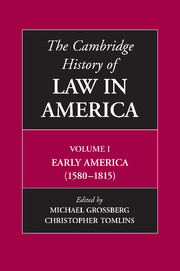Book contents
- Frontmatter
- 1 Law, Colonization, Legitimation, and the European Background
- 2 The Law of Native Americans, to 1815
- 3 English Settlement and Local Governance
- 4 Legal Communications and Imperial Governance: British North America and Spanish America Compared
- 5 Regionalism in Early American Law
- 6 Penality and the Colonial Project: Crime, Punishment, and the Regulation of Morals in Early America
- 7 Law, Population, Labor
- 8 The Fragmented Laws of Slavery in the Colonial and Revolutionary Eras
- 9 The Transformation of Domestic Law
- 10 Law and Religion in Colonial America
- 11 The Transformation of Law and Economy in Early America
- 12 Law and Commerce, 1580–1815
- 13 Law and the Origins of the American Revolution
- 14 Confederation and Constitution
- 15 The Consolidation of the Early Federal System, 1791–1812
- 16 Magistrates, Common Law Lawyers, Legislators: The Three Legal Systems of British America
- Bibliographic Essays
- Notes on Contributors
- Index
- References
5 - Regionalism in Early American Law
Published online by Cambridge University Press: 28 November 2008
- Frontmatter
- 1 Law, Colonization, Legitimation, and the European Background
- 2 The Law of Native Americans, to 1815
- 3 English Settlement and Local Governance
- 4 Legal Communications and Imperial Governance: British North America and Spanish America Compared
- 5 Regionalism in Early American Law
- 6 Penality and the Colonial Project: Crime, Punishment, and the Regulation of Morals in Early America
- 7 Law, Population, Labor
- 8 The Fragmented Laws of Slavery in the Colonial and Revolutionary Eras
- 9 The Transformation of Domestic Law
- 10 Law and Religion in Colonial America
- 11 The Transformation of Law and Economy in Early America
- 12 Law and Commerce, 1580–1815
- 13 Law and the Origins of the American Revolution
- 14 Confederation and Constitution
- 15 The Consolidation of the Early Federal System, 1791–1812
- 16 Magistrates, Common Law Lawyers, Legislators: The Three Legal Systems of British America
- Bibliographic Essays
- Notes on Contributors
- Index
- References
Summary
Early Americans created regionally particular legal systems. Two centuries of nationhood have since brought a great measure of uniformity in certain areas of American law – the adoption of federal rules of procedure, the growth of a federal judiciary, a uniform commercial code, and a national system of legal education are just a few. Yet in certain respects American law remains regionally specific. The nation’s ninety-four federal district courts, for example, are grouped into regional circuits whose decisions occasionally conflict and are not resolved. Perhaps in our own time regional distinctiveness is stronger in American culture and political discourse than in actual legal reality. Nevertheless, both its factual existence and its cultural potency are clear.
American regionalism has its roots in early America. In the case of law, the particular goals and variant experiences of unrelated colonization ventures led to the reanimation and recombination of English legal practices in different ways in the new environments. Colonists emphasized some English practices while rejecting others, resulting ultimately in the emergence of three new and distinct regional configurations – the Chesapeake and its Southern neighbors, New England, and the Middle Colonies.
- Type
- Chapter
- Information
- The Cambridge History of Law in America , pp. 144 - 177Publisher: Cambridge University PressPrint publication year: 2008
References
- 8
- Cited by

